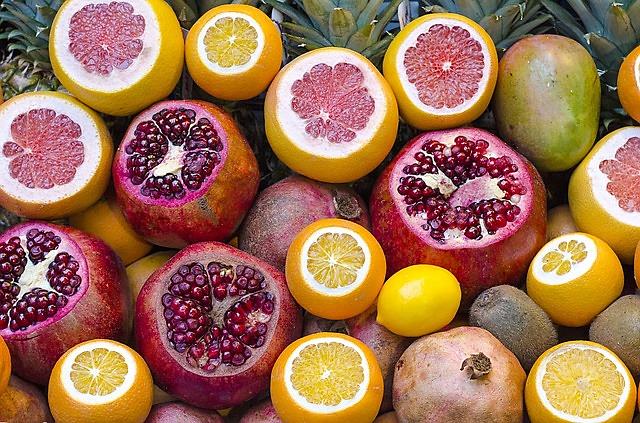
by Fern Shaw | Nov 9, 2015 | Health and Hydration, Water
Typing the query ‘which fruit contains the most water’ into the omnipresent Googlio, and BAM! this is what came up:
‘Grapefruit.’
Then more about watermelon and strawberries – thing is, watermelon and strawberries seem to contain more water than grapefruit – ninety two percent as opposed to the ninety one percent of water in grapefruit. This leads me to believe that there’s some secret grapefruit marketing organisation that’s fruit bombing Googlio to ensure that the lesser watered grapefruit receives pole position.
Anyhow, I’m all okay with it – I really enjoy grapefruit, not so much watermelon. It may stem from my clever mother who used to prepare our half a grapefruit with a sprinkle of brown sugar and a Maraschino cherry on top every single morning, rain or shine; or because I’ve just always enjoyed the more citrus of fruits.
Grapefruit also contain powerful anti-oxidants. What are anti-oxidants? Well, simply put, they are one of the first lines of defence that the body employs to keep free radicals in check and prevent them from causing a domino effect of damage on other cells. Antioxidant compounds can ‘donate’ electrons to unstable free radicals so they don’t have to snatch electrons from unsuspecting nearby cells.
The rich pink and red colours of grapefruit are due to lycopene, a carotenoid phytonutrient. A carotenoid gives fruit their red, orange and yellow colour. These compounds are believed to protect against certain cancers, heart disease and even vision loss due to macular degeneration. You won’t find lycopene in white grapefruit. White grapefruit? Didn’t know there was white grapefruit! Continuing, lycopene appears to have anti-tumour activity. Among the common dietary carotenoids, lycopene has the highest capacity to help fight oxygen free radicals, which are compounds that can damage cells.
So, aside from its top ranking despite it having the second highest water content, it would seem that grapefruit is all that.
Something to keep in mind as we head into the colder months and you’re probably more inclined towards comfort food and drinking less water, is to look to the grapefruit with its high water content and it being packed full of all that is good for you.
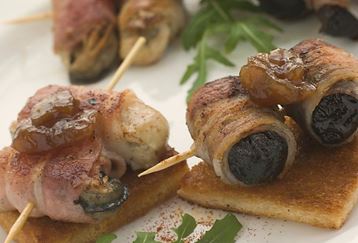
by Fern Shaw | Nov 9, 2015 | Water
Recently I blogged about various dishes with really bizarre names that originate from different cultures. I also mentioned that we Britons certainly aren’t alone when it comes to naming our scoff weirdly.
I said that at a later date I’d be expounding further on more of these dishes found in Britain, so without further ado, I present these to you. I’m going to grade these dishes in the following manner – the more unsightly or unpalatable a dish (in my very unprofessional opinion) – the more glasses of water you need to drink while consuming the dish.
Toad in the hole
Perhaps Britain’s least appetisingly-named meal, this dish of sausages in Yorkshire pudding batter is said to have gained its unusual moniker because it looks like toads popping their heads from a hole (yes, I know, I can’t really see it either). Can’t stand the dish? At least you’re not eating it in the Victorian period, when it was common to use any available meat, however old or unpleasant. Mrs Beeton suggests rump steak and lamb kidney. ~ ½ a glass of water.
Bubble and squeak
Once upon a time, thrifty Britons with left-over vegetables and potatoes from a roast dinner wouldn’t have even considered throwing them away – they’d have fried the remnants up to make bubble and squeak. The name comes from the sizzling noise the vegetables make in the pan, though it could also adequately describe the horrified sounds your children emit next time you propose to cook it. ~ 0 glasses of water. Delicious meal if cooked right.
Welsh rarebit/rabbit
Tourists in Wales must be regularly disappointed to find that the traditional ‘rabbit’ they’ve ordered is little more than a gourmet version of cheese on toast. The name is said to be something of an English joke, coined in the 18th century when many Welsh were so poor they could not even afford a cheap meat like rabbit. Hilarious. ~ 0 glasses of water. Delicious.
Stargazey pie
Stargazey pie sounds rather quaint, but this Cornish dish of pilchards baked under a pastry crust won’t appeal to everyone – it traditionally has fish heads poking through the crust, so they appear to be gazing up at the sky. Legend has it that the dish originates from the village of Mousehole, where a plucky fisherman called Tom Bawcock once saved his fellow villagers from starvation by braving the stormy seas to catch a record haul. The fish were baked poking out of the pies, to prove to everyone that there was fish inside. ~ 1 glass of water.
Angels on horseback
This traditional Victorian appetizer of oysters wrapped in bacon and grilled is little known today. But the snack’s dastardly cousin, the devil on horseback (prunes or dates wrapped in bacon) is still a common feature of our Christmas dinners.
~ 1 glass of water.
Stinking Bishop
Anyone who’s been within smelling distance of this particular cheese understands the first part of its name: The wheels are said to have an odour that brings to mind dirty socks and wet towels. But the second half is purely coincidental. It’s actually derived from Stinking Bishop pears, whose juice the cheese is immersed in. The pears got their name from their farmer, Mr. Bishop.
~ 2 glasses of water. And a clothes peg for your nose.
Headcheese
Oddly enough, headcheese isn’t cheese at all. But you’re going to wish it were. The gelatinous meat is made from chopped-up bits of the head of a pig, calf or cow – including the tongue – and sometimes the feet and heart. The origins of its name are unclear, but it’s been suggested the source of the name could be either because the recipe used to contain cheese or because of the connected etymology of the words cheese and moulded (moulds are used to make headcheese).
~ One of our 18.9ℓ bottles of water. Minimum.
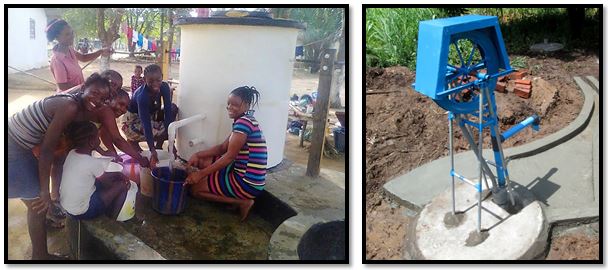
by Fern Shaw | Sep 15, 2015 | Water
Here at AquAid, we’ve always believed that an integral part of good business practice is helping those less fortunate – especially those far flung communities in Third World countries.
This philosophy was put into effect by ensuring that a portion of proceeds from all sales of our water cooler products was donated to sustainable charities such as Christian Aid and The Africa Trust.
The Africa Trust itself has gone from strength to strength – with more than 5,000 water wells, known as Elephant Pumps, built throughout Africa since 1998.
Building the Elephant Pumps has taken the teams from Zimbabwe, Uganda, Malawi, Tanzania, Kenya, and Liberia where these wells now provide potable water for millions of people.
The original Elephant Pump is suitable for high levels of usage and also for deep water tables. Although the aim is for one pump to be for around 300 beneficiaries per pump, in some cases many more people end up using a single pump.
But what happens when you enter regions where the water table is not that deep or the community is smaller? If you’re Ian Thorpe, CE of The Africa Trust and inventor of The Elephant Pump, you design an alternative.
So, without further ado, we introduce *trumpet* to you the ‘Baby’ Elephant Pump.
- This smaller pump has recently been introduced in in a trial project in Mozambique, where there are areas where the communities are more dispersed with small clusters of families.
- A pump which lifts water only 5-10 metres and serves just 50 or 100 people doesn’t need to be built with such robust materials such as is the case with the original ‘parent’ Elephant Pump, hence the design and building of the Baby Elephant Pump.
- The design is cheaper and has been developed for individual homesteads rather schools or villages therefore the smaller pump costs less than half the cost of the more robust village model of Elephant Pump.
If you would like to find out about sponsoring the building of one of these pumps without any additional cost to you*, please contact Shelly or call 01223 508 109 – we’ll be delighted to assist you.
*This offer is only available to AquAid customers.

by Fern Shaw | Sep 15, 2015 | Water
Of course, it is! And to prove as much, we’re including a photo of one of our environmentally friendly delivery vehicles. Works really well until such time as they encounter a low bridge. Bada-dish!
You didn’t like that? Then may I draw your attention to a selection of the best jokes from the Edinburgh Fringe Festival that was held in….. (go on, can you guess?) recently?
I bought a muzzle for my pet duck. Nothing flashy, but it fits the bill. Chris Turner
Recently in court, I was found guilty of being egotistical. I am appealing. Stewart Francis
Went to my allotment and found that there was twice as much soil as there was the week before. The plot thickens. Darren Walsh
You can’t lose a homing pigeon. If your homing pigeon doesn’t come back, then what you’ve lost is a pigeon. Sara Pascoe
When my wife and I argue, we’re like a band in concert: we start with some new stuff, and then we roll out our greatest hits.
Frank Skinner
Surely every car is a people carrier? Adam Hess
What’s the difference between a ‘hippo’ and a ‘Zippo’? One is really heavy; the other is a little lighter. Masai Graham
If you think about it a little more – water is loads funny – slipping in water, falling into the koi pond (I really, really did this once, when I was all of 12) fully dressed; water bombs; tossing a glass of water at someone’s mug … it’s FUNNY. I could of course tell you what I believe is the all-time funniest joke about drinking water (which wasn’t all water as the imbiber soon found out) but this is an R-rated page, so perhaps not.
So perhaps water is funnier in motion and visually than in print, but yep, it’s still funny.
For a look at more water humour, have a gander here. If you have any material or funny images you’d like to share, pop them across to us at shelly.crawford@aquaidwatercoolers.co.uk
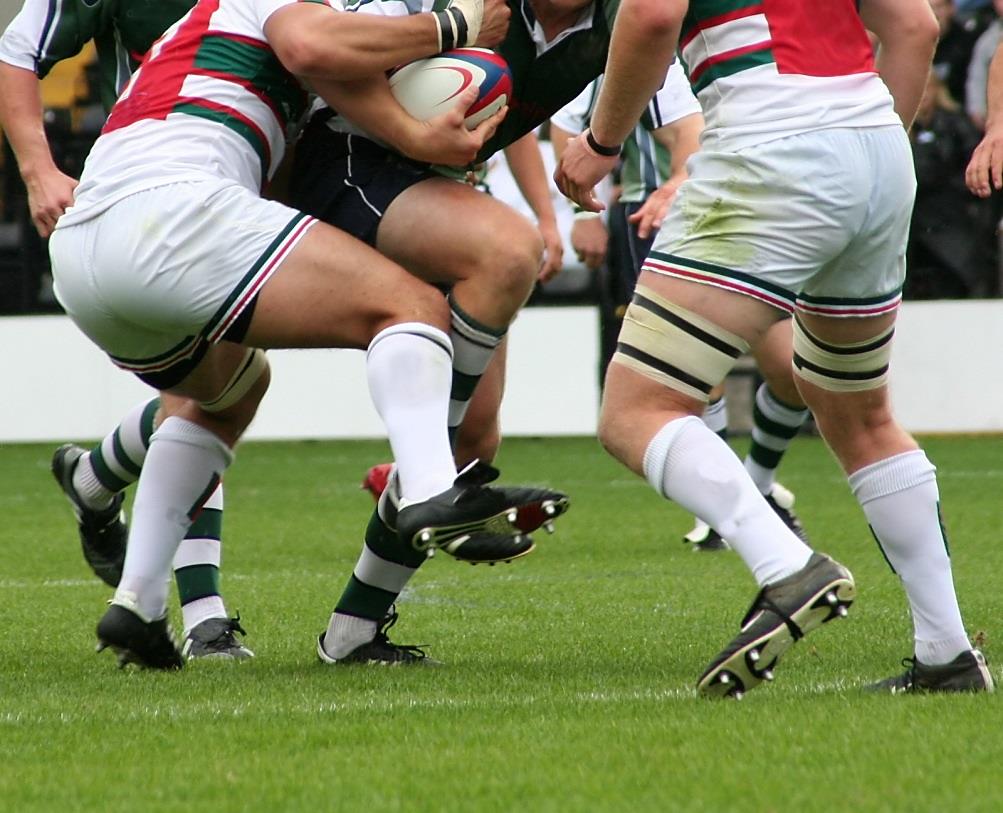
by Fern Shaw | Sep 15, 2015 | Health and Hydration, Water
Great excitement abounds as we draw closer to the 2015 Rugby World Cup being held in the U.K. this year, starting on 18 September and the final being played at Twickenham on 31 October. One would hope so, as rugby was invented in England in 1823. Legend has it that during a game of football at Rugby School in Warwickshire, a 16 year old student, William Webb Ellis, caught the ball and ran with it towards the opponent’s goal line, rather than following the rules of the times of catching and kicking the ball only.
From our side, as we’re all about things water, we’ve approached keeping hydrated from two angles – keeping yourself hydrated when playing the sport and how to keep yourself hydrated as a fan of the sport!
Perhaps you’re more couch potato than skinny fries when it comes to your sports participation. That’s why when you go from supine to five jumping jacks in a short time, you feel faint, you’re sweating bullets, your heart races, your face turns an interesting shade of puce and you may just feel like purging your most recent meal. This description should give you some idea of why your hydration needs are very different from your favourite rugby team.
Sports Hydration
As you can imagine, the physical and mental energy expended in a rugby match is monumental. In order to keep an athlete’s body (and mind) in peak condition, hydration and rehydration are of paramount importance. An example of just how important hydration is? A player can lose up to 3 to 4 kilograms during one match.
Although this year the temperatures won’t be soaring like they did at the 2013 Rugby League World Cup in Papua New Guinea, where the thermometer reached a cracking 33°C, players always go through strenuous pre-match tests to ensure that they are properly hydrated.
They are weighed before and after training, they have urine tests every day and they fill in wellness charts. If temperatures tend to soar during matches, additional breaks can be implemented during each half. The good news is that these players, their coaches and managers are all highly experienced. So, that’s them covered – now we worry about you, the supporter.
Supporter Hydration
Being a rugby supporter can also be very strenuous – take it from me – at the 2007 Rugby World Cup, there was a lot of supporting, jumping up and down, cheering and moaning going on, and we won’t make too much mention of the quaffing of the many shots in support of one’s national team – usually a concoction of luminescent coloured alcohol. Thirsty work all round, but quenching one’s thirst in the altogether incorrect manner with nary a bottle of water to be seen. Not the right way to stay strong for your team!
So in order to actually enjoy the entire event (instead of giving it your all during one match and spending the remainder of the World Cup hiding underneath your duvet), be kind to yourself:
If you’re fortunate enough to be attending the matches at any of the stadiums:
– Check to see if you can take your own water in with you.
– If you’re walking long distances to get to stadiums, as always, make sure you’ve plenty of bottled water to drink.
– If you’re staying home and know that your supporting is going to be a steady diet of drinking and fry-ups, try to make sure that before you get into supporter mode you drink lots of water. This will mean that you should have more energy in reserve when it comes to the all-important cheering, jumping up and down and singing mentioned beforehand.
Right, you’re sorted, my work here is done. If you need me, I’ll be the one in the Scotland rugby jersey, singing, ’Doe-a-deer’ and ‘Scoooootttlannnd / Scoooooooootttllannnnnd’.
On a more serious note, if you think you or your company will be thirsty during the World Cup, we are so the right people to speak to. Call us on 0800 772 3003 or e-mail us at shelly@aquaidwatercoolers.co.uk
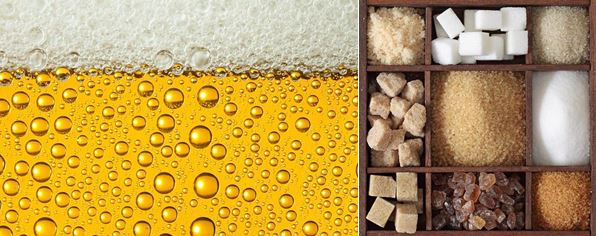
by Fern Shaw | Sep 11, 2015 | Water
Everyone knows that if a person is in shock one of the most effective ways of combating it is to give the person some sugar water to drink. This raises the blood sugar levels almost immediately.
But perhaps we haven’t realised just how bad sugar can be for us and also how much of it can be found in our favourite tipple.
So before you think you’re in the clear when it comes to quaffing your drink of choice – here are a few indicators of just how much sugar is in your favourite bevy:
*Your quintessential GIN & TONIC contains four teaspoons of sugar.
VODKA & CRANBERRY contains a whopping 7.5 teaspoons of sugar. Admittedly vodka itself has pretty much zero sugar, but then we weren’t all brought up drinking neat vodka.
RUM & COKE contains a un(healthy) seven teaspoons of sugar.
When we move onto unmixed alcohol, like ciders, wines and beers, the results are a little more cheerful:
CIDER is probably the worst culprit, with around 5 teaspoons of sugar per bottle.
WHITE WINE has a lower sugar content – 1.5 teaspoons of sugar – but this of course depends on which white wine you’re drinking.
RED WINE is probably about your safest bet with only a quarter teaspoon of sugar per glass.
The good news is that BEERS and ALES contain the least sugar overall.
A bottle of BEER contains around 0.5 of a teaspoon of sugar and a bottle of ALE contains about 1 teaspoon.
So, although this should have you heading on down to your local and raising your glass, full of good beer cheer, you’ll need to bear in mind that a lot of your beers and ales also contain additives, corn syrups, preservatives and colorants.
Of course, seeing as AquAid are all about water, you have to have known that there had to be a mention in here somewhere, so here it is:
All of the above drinks start with water and a combination of processes, whether it’s mixing water with barley or water with potatoes – which is, I suppose, quite a plus – as this means, in essence, you are drinking water.
If it’s unlikely that you’re about to give up your favourite tipple, irrespective of how much or how little sugar it has – try this option out – for every drink you have, match it with a glass of water.
Then there’s the final option (which may just have the majority of us running for the hills with some home-made distilling type set-up) which involves ditching the drinks and all that sugar and sticking to drinking water. It may not give you the same kick as neat vodka will (also zero percent sugar) but you’ll never have to count sugar content again.
Bottoms up!
*Volumes here are loosely based on either a 500ml bottle or a glass of.






